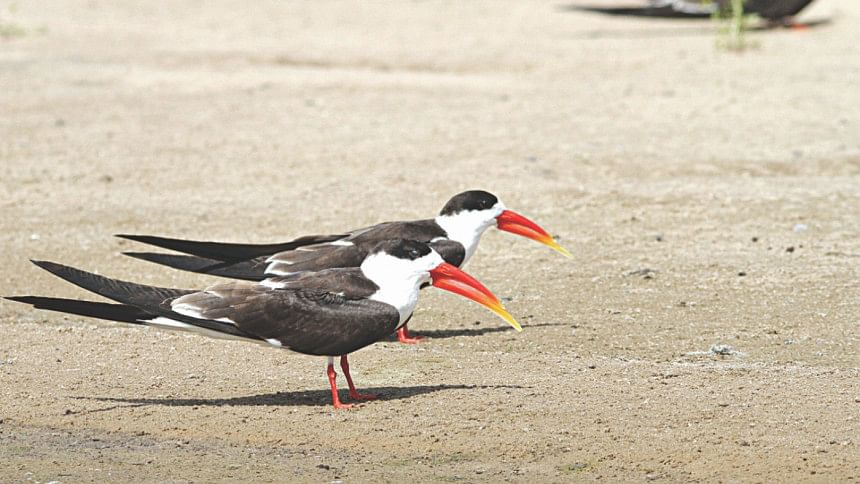Nature Quest: Save nesting grounds for birds

A few pieces of wasteland that happen to be the breeding grounds for three species of "globally threatened" birds have recently attracted our attention. Any breeding ground for one globally threatened species anywhere is considered a place of great conservation value.
The places we are talking about are the newly accreted chars (shoals) in the Padma river in Chapainawabganj and Rajshahi. We are delighted to observe the breeding activities of the three species of globally threatened birds here this summer.
The globally threatened birds that we saw nesting on the chars of the Padma are Black-bellied Tern, Indian Skimmer and Bristled Grassbird.
The population of Black-bellied Tern has been declining sharply over the past decades and is now seen in Bangladesh only over the Padma river in Chapainawabganj. It is a globally endangered bird and considered "critically endangered" in Bangladesh. We were pleased to see it nesting on the chars in the Padma. The Indian Skimmer, a globally vulnerable bird, is also considered "critically endangered" in Bangladesh. Previously, our researchers tried very hard to locate the nesting grounds of these two threatened species in Bangladesh, but could not find any.
While Black-bellied Terns and Indian Skimmers nest on the bare sand, the Bristled Grassbird nest in the scrub jungle growing on the chars and along the riverbank. Bristled Grassbird is a globally vulnerable bird, which is "endangered" in Bangladesh. It nests on the ground covered by grass or bushes. The only place where this bird was known earlier to breed is Tanguar Haor. Due to early flash flood, the grassland of Tanguar Haor was not a safe breeding place for Bristled Grassbird.
The breeding grounds, mainly the chars of Chapainawabganj and Rajshahi, for the three threatened species of birds must be protected. The land, known as Khas land, is owned by the government. The ground-nesting birds need to incubate eggs and raise chicks on the bare ground. The birds need the char land for at least two to three months -- June to August -- to raise their chicks.
But cattle traders, fishermen, farmers and their domestic animals often hamper the breeding activities of the birds there.
One day, 20,000 cattle coming to Bangladesh from India were seen stampeding through the char where Black-bellied Tern and Indian Skimmer were nesting. We checked later only to find that all nests were abandoned. No chicks of any of the two species were found on our repeated visits there this year.
In Rajshahi, we witnessed similar incidents of breeding grounds getting damaged. Hundreds of grazing cattle rampaged through the nesting grounds of Bristled Grassbird. The damage there, however, was not as extensive as it was on the chars of Chapainawabganj.
We all should try to protect these uninhabited chars for the conservation of the endangered birds. And it can be done only if we know their conservation value. We also urge the government to take steps to protect the chars before the three precious birds perish completely.

 For all latest news, follow The Daily Star's Google News channel.
For all latest news, follow The Daily Star's Google News channel. 



Comments